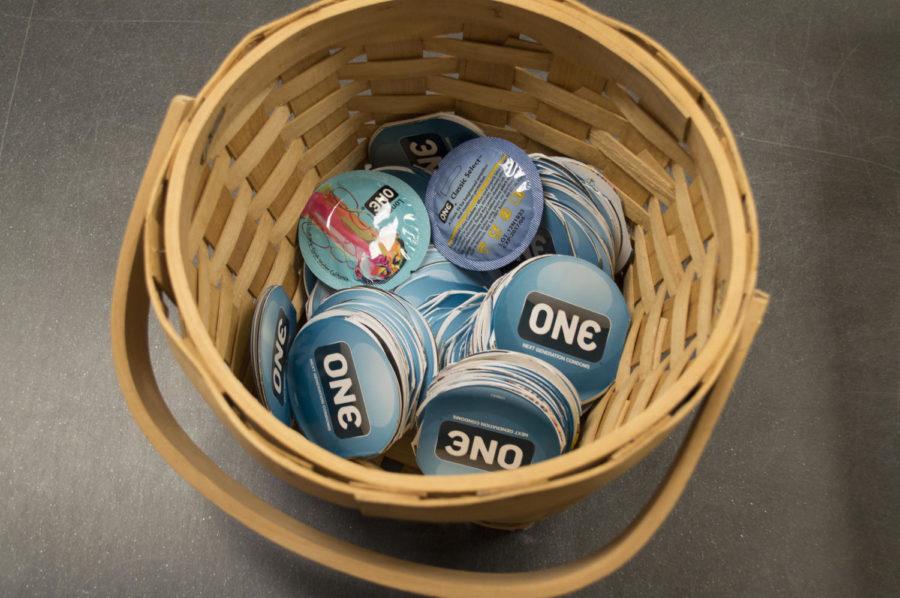Lawson: Male birth control should be on the market to even out conception responsibility
Charlie Coffey/Iowa State Daily
The residence hall desks across campus offer free condoms to students on certain days of the week.
January 12, 2016
Let’s play a quick game of Would You Rather; would you rather wear a bulletproof vest or be shot with an empty gun?
Women have been tasked with the responsibility of birth control even though they cannot get pregnant without the sperm of men. Doesn’t it make sense to dismantle the sperm instead of making the uterus “impenetrable?”
While that game of Would You Rather? seems completely unrelated, it actually perfectly explains the way that birth control has worked for both genders and why the addition of male birth control actually makes a lot of sense.
It should be noted that male birth control does not imply that men should have to take a little pill at the same time every day, which women have so long had to do. Birth control, quite literally, means controlling the time at which a man and woman choose to conceive a child. Since both parties should be involved in making that choice, both genders should be charged with putting up strong barriers for the times that conceiving a child is unwanted.
Many options are available for men to prevent pregnancy, including vasectomies. While this is the most drastic option, it is a semi-permanent solution because it can, in some cases, be reversed. This type of birth control is not the right fit for every man, however. Other options include condoms, pulling out and abstinence, but when you think about the options for men, that’s really all that is available.
For women, the birth control options are vast: the classic pill, the patch, IUDs, implants, the sponge, vaginal rings, the shot and many more. Why is this such a one-sided conversation when “it takes two to tango?” Men should have more options to prevent pregnancy and be active in their family planning.
Different forms of male birth control exist, but they are not yet on the U.S. market. There is Vasalgel, a gel substance that is injected into the sperm distributing tube outside of each testicle and blocks the sperm from reaching its final destination, similar to a filter. Vasalgel can last up to 10 years, and if the male decides that he wants to have children before 10 years are up, he can flush out the Vasalgel. Vasalgel is unavailable for men on the U.S. market and is in a clinical trial for animals and awaiting human trials.
MENT is an implant for men that is similar to Nexplanon. It is embedded under the skin and releases a synthetic testosterone to decrease sperm cell production. It is a long-term and minimal solution. MENT is not available in the U.S. market but is currently in phase two of its clinical trial.
Nestorone gel is a gel contraceptive that is applied to the arm or abdomen that essentially shuts off the sperm-producing hormones in men. This form of birth control is not permanent and is short-term.
Two pills, Gendarussa and Eppin, are now available to men and are making their way around the world. Gendarussa is a plant-based contraceptive that makes sperm unable to penetrate the egg that inhibits fertilization.
Eppin is essentially an anti-eppin drug. It is a protein that covers the surface of sperm. The protein is bound to the sperm until an enzyme removes semenogelin, a protein in seminal fluid that allows the sperm to swim to the egg. The Eppin contraceptive binds to the eppin protein, making the sperm unable to swim because it resembles the semenogelin binding before ejaculation.
I have named five new alternatives to the currently available male contraceptives that are all good solutions and put the responsibility of family planning in the hands of the male party. They are not approved in our country yet, but other countries are conducting clinical trials and getting them ready to make their market appearance. So why not us?
I don’t have one single reason because there are so many, including money. Pharmaceutical companies stand to lose money by putting these on the market because male contraceptives have a longer life than female contraceptives, so they do not need to be purchased as frequently.
Another possibility is that funding for the drug trials is hard to come by. If there was a larger outcry for more male contraceptives, there would need to be an increase in funding for these medications.
To be blunt, there is no plain answer as to why there are not more male contraceptives on the market. We have the technology and the means, so why are they not being approved by the FDA for market sale when they have been successful in other drug trials?
Male contraceptives would provide relief to women and level out the responsibility of both parties. Female contraceptives are effective because they manipulate the hormones and have different varying side effects. Male contraceptives would essentially do the same but take it a step further. They would eliminate the necessary “ingredients” to make a child. Male contraceptives are better alternatives and give men the opportunity to be in charge of their fertility.
















